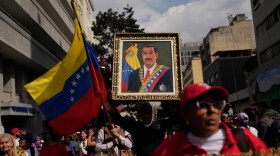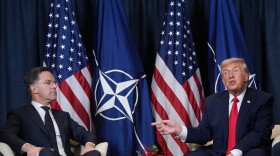-
Miami Herald journalist who broke Jeffrey Epstein case tells WLRN feds cannot ignore crimes, victimsIn an exclusive interview with WLRN, Miami Herald investigative reporter Julie Brown said millions of newly released documents related to convicted pedophile Jeffrey Epstein's sex trafficking case is a litmus test of the American justice system’s ability to protect its most vulnerable citizens.
-
In an exclusive sit-down with NBC News’ Kristen Welker from Caracas, Venezuelan President Delcy Rodríguez committed to holding "free and fair" elections while signaling a potential thaw in relations with the United States.
-
Cuban aviation officials have warned airlines of a fuel shortage for refueling on the island. This is part of energy rationing as the Trump administration cuts Cuba off from its fuel sources. A commercial pilot confirmed the notice was sent Sunday.
-
Prolonged detention has become more common in President Donald Trump’s second term, at least partly because a new policy generally prohibits immigration judges from releasing detainees while their deportation cases wind through backlogged courts.
-
Attorneys representing the U.S. Department of Homeland Security have for months worked to cast doubt on the grant award, describing plans to provide federal funding as “unrealized” and “legally insufficient.”
-
Hundreds of thousands of Haitians under Temporary Protected Status woke up relieved after a federal judge blocked the Trump administration from ending the immigration status. Haitian TPS holders are still in limbo.
-
Thirty days after the U.S. captured then-President Nicolás Maduro, Venezuela remains in turmoil. Many citizens are unsure about the current situation, with fears of further attacks and government repression. Acting President Delcy Rodríguez faces questions about her autonomy and potential U.S. influence.
-
President Donald Trump says the U.S. used a secret weapon he called "The Discombobulator" to disable Venezuelan equipment when the U.S. captured Nicolás Maduro. The president also renewed his threat to conduct military strikes on land against drug cartels, including in Mexico. Trump made the comments in an interview Friday with the New York Post.
-
Mexico's security minister says the country has sent 37 more cartel members to the United States. The announcement came Tuesday as the U.S. increases pressure on governments to tackle drug smuggling networks. This marks the third time in the past year that Mexico has transferred detained cartel members to the U.S. Harfuch noted that the government has sent a total of 92 people so far.
-
The first year of President Donald Trump’s return to the White House was defined by clashes with the judiciary branch, as the president and his administration pushed forward with an aggressive immigration agenda.
-
The newly designated roadway spans Southern Boulevard between Kirk Road and South Ocean Boulevard, near Palm Beach International Airport and President Donald Trump’s Mar-a-Lago Club.
-
South Florida U.S. Congresswoman Debbie Wasserman Schultz says she sees no progress toward democracy in Venezuela following the ousting of authoritarian leader Nicolás Maduro.
Play Live Radio
Next Up:
0:00
0:00
Available On Air Stations












